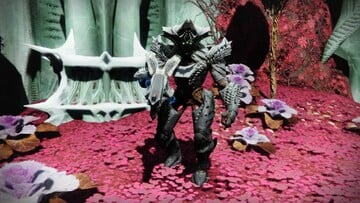A Major is a high-power combatant of any species or class. They can be distinguished by their yellow health bars and sometimes unique names. These enemies have more health and attack power than regular enemies, and may be equipped with Absorption Shields their base counterparts lack. Most majors are also more alert, and will often strafe sideways to dodge incoming attacks. Majors can appear anywhere from Patrols to Raids and can come in the form of any enemy species.
Destiny
Majors often have a unique identification, such as a yellow health-bar, or even proper names. However, all races possess common Major versions of their units.
- Reaver Shank
- Turret Shank
- Sniper Shank
- Reaver Dreg
- Reaver Vandal
- Reaver Captain
- High Servitor
- Axis Goblin
- Axis Hobgoblin
- Axis Harpy
- Axis Minotaur
- Axis Hydra
- Cyclops Disciple
- Precursors
- Descendants
- Psion Operant
- Psion Flayer
- Psion Burner
- Imperial Legionary
- Imperial Phalanx
- Imperial Centurion
- Imperial Colossus
- Tortured Vandal
- Tortured Captain
- Tortured Thrall
- Tortured Acolyte
- Tortured Wizard
- Tortured Knight
- Tortured Goblin
- Tortured Hobgoblin
- Tortured Minotaur
- Tortured Psion
- Tortured Phalanx
- Tortured Centurion
Destiny 2
Majors in Destiny 2 are also identified as Mini-Boss by the game, with their original role of "stronger line soldier" being taken by Elites. Like the latter, they usually have different, more ornate designs and colorations. Killing or finishing a Major has a higher chance to yield Power Ammo. Majors often have names themed around the activity they appear in, like the "Deceived" enemies of Gambit, while other times they are named like their Minor or Elite version. Some rare enemies only appear as Major or stronger units, like Tormentors. However, some common reoccurring ones exist.
Common Cabal Majors are called Esteemed. In the Red Legion and its Deserters, they can be identified by primarily golden armor. In the Shadow Legion, they wear white armor with gold highlights. Among the Loyalists, Majors maintain their name, but wear heavier armor with even more gold. Some Cabal factions also have an elite "Guard" division that appears in many activities, with different armor and always equipped with Absorption Shields.
Common Major Fallen are called Resolute. Eliksni of the House of Dusk are identifiable by their primarily black armor with purple straps and golden highlights. In the House of Salvation, Majors make heavier use of blue clothing an fur pelts. Mechanical units of both factions don't change in appearance.
The common Majors of the Hive are called Blistered. In Savathûn's Brood, they can be distinguished by darker brown chitin. In the Hidden Swarm, the chitin on the lower body is more faded beige, while the upper body is a deep crimson. In the Lucent Brood, they can be identified through their dark chitin with extensive white paintings. The Majors of the Grasp of Nokris were called Dread Unhallowed, and had even larger icy growths over their bodies.
Major Scorn are called Tarnished, while Abominations are called Lacerated. They sport no notable differences from their base counterparts.
Major Taken are called Servile, except for Taken Ogres, who are called Devoured. They can be distinguished through the golden glow of their bodies and the large spikes jutting out of them.
- Devoured Ogre
- Servile Captain
- Servile Centurion
- Servile Goblin
- Servile Hobgoblin
- Servile Knight
- Servile Minotaur
- Servile Phalanx
- Servile Vandal
- Servile Wizard
Common Major Vex are called Malignant. In the Sol Collective, they can be distinguished through their oxidized white chassis. In the Sol Divisive, they sport even larger amounts of vegetation.
Champions
Champions are a specific type of Major, gifted with an ability that makes them almost invincible. While they can be killed like normal enemies, they are intended to be defeated by using an effect that stuns them. They are commonly found in activities with higher elected difficulties, like Nightfalls and Lost Sectors.
Trivia
- Certain Majors have a delayed spawning glitch which gives them extra health and attack power of several Majors. A notable example is Randal the Vandal.
- Fallen Majors of the House of Dusk had the color of their straps changed to black at some point, returning to purple only at the release of Season of the Deep.

